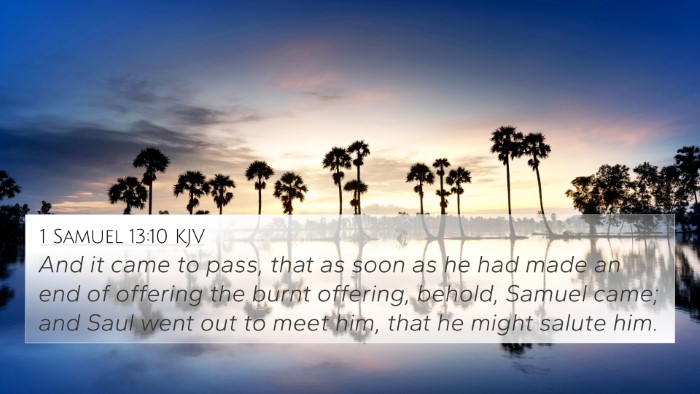Old Testament
Genesis Exodus Leviticus Numbers Deuteronomy Joshua Judges Ruth 1 Samuel 2 Samuel 1 Kings 2 Kings 1 Chronicles 2 Chronicles Ezra Nehemiah Esther Job Psalms Proverbs Ecclesiastes Song of Solomon Isaiah Jeremiah Lamentations Ezekiel Daniel Hosea Joel Amos Obadiah Jonah Micah Nahum Habakkuk Zephaniah Haggai Zechariah MalachiActs 25:13 Similar Verses
Acts 25:13 Cross References
And after certain days king Agrippa and Bernice came unto Caesarea to salute Festus.
Uncover the Rich Themes and Topics of This Bible Verse
Listed below are the Bible themes associated with Acts 25:13. We invite you to explore each theme to gain deeper insights into the Scriptures.
Acts 25:13 Cross Reference Verses
This section features a detailed cross-reference designed to enrich your understanding of the Scriptures. Below, you will find carefully selected verses that echo the themes and teachings related to Acts 25:13 KJV. Click on any image to explore detailed analyses of related Bible verses and uncover deeper theological insights.

1 Samuel 13:10 (KJV) »
And it came to pass, that as soon as he had made an end of offering the burnt offering, behold, Samuel came; and Saul went out to meet him, that he might salute him.

1 Samuel 25:14 (KJV) »
But one of the young men told Abigail, Nabal's wife, saying, Behold, David sent messengers out of the wilderness to salute our master; and he railed on them.

2 Samuel 8:10 (KJV) »
Then Toi sent Joram his son unto king David, to salute him, and to bless him, because he had fought against Hadadezer, and smitten him: for Hadadezer had wars with Toi. And Joram brought with him vessels of silver, and vessels of gold, and vessels of brass:

Acts 25:22 (KJV) »
Then Agrippa said unto Festus, I would also hear the man myself. To morrow, said he, thou shalt hear him.

Acts 8:40 (KJV) »
But Philip was found at Azotus: and passing through he preached in all the cities, till he came to Caesarea.

Acts 26:1 (KJV) »
Then Agrippa said unto Paul, Thou art permitted to speak for thyself. Then Paul stretched forth the hand, and answered for himself:

2 Kings 10:13 (KJV) »
Jehu met with the brethren of Ahaziah king of Judah, and said, Who are ye? And they answered, We are the brethren of Ahaziah; and we go down to salute the children of the king and the children of the queen.
Acts 25:13 Verse Analysis and Similar Verses
Understanding Acts 25:13
In Acts 25:13, we see a pivotal moment in the life of the Apostle Paul as he encounters powerful political figures. This verse reads:
"And after certain days king Agrippa and Bernice came unto Caesarea to salute Festus."
Verse Summary
This verse describes the visit of King Agrippa and his sister Bernice to the Roman governor Festus. Their presence signifies the political intrigue and the significance of Paul's situation as he was being held in custody.
Commentary Insights
From a comprehensive study of public domain commentaries, we can derive several key insights regarding the meaning of this verse:
- Matthew Henry's Commentary: Henry notes that Agrippa's visit reflects the political atmosphere of the time. The visit is not merely for pleasantries but indicates a deeper interest in Paul’s case, illustrating the interplay between politics and faith.
- Albert Barnes' Notes: Barnes emphasizes the role of Agrippa as a representative of Jewish authority, which highlights the importance of the Jewish council's reaction to Paul's actions and their faith. His arrival adds a crucial dimension to the legal proceedings against Paul.
- Adam Clarke's Commentary: Clarke focuses on the character of Agrippa and Bernice, noting their controversial background. Agrippa's curiosity about Paul not only indicates his awareness of Paul's earlier reputation but also sets the stage for significant discussions about faith and law.
Thematic Connections to Other Bible Verses
Acts 25:13 can be related to various other verses in the Bible that echo themes of political authority, faith's intersection with governance, and personal testimony. Here are several significant cross-references:
- Acts 26:1-3: Paul's defense before Agrippa that leads to deeper discussions about his conversion and faith.
- Matthew 10:18: Jesus' promise to his followers about being brought before governors and kings for His sake.
- Romans 13:1: The biblical principle that all authority is ordained by God, connecting the political aspect of Paul's trial.
- Philippians 1:13: Paul's imprisonment resulted in the furtherance of the Gospel even among the elite due to his bold witness.
- 1 Peter 2:13-17: Instructions about submitting to authorities, relevant to Paul's situation under Roman rule.
- 2 Timothy 4:16: Paul's reflection on standing alone at his trial, emphasizing his faith in the judiciary process.
- John 18:36: Jesus’ declaration that His kingdom is not of this world, resonating with Paul’s own mission and trials.
- Acts 24:10-13: Paul’s earlier defenses before Felix which set a precedent leading up to this crucial moment.
- Esther 3:1-2: Political interactions in biblical history that echo the complexity of leadership and influence.
- Galatians 6:9: Paul’s perseverance in doing good, despite the challenges of his trials before rulers.
Inter-Biblical Dialogue and Cross-Referencing Effectively
Cross-referencing is a robust tool in understanding the Bible. Acts 25:13 provides an opportunity to practice systematic cross-referencing across scripture by creating dialogues between various biblical texts. Below are some methodologies and tools:
- Bible Concordance: Use a concordance to locate terms such as "authority," "kings," and "testimony" to explore their thematic connections.
- Cross-Reference Guides: Employ guides that list related verses, helping to build thematic insights alongside Acts 25:13.
- Comparative Bible Study: Engage in comparative studies within Pauline epistles to understand the apostolic teachings in the light of political circumstances.
- Tools for Cross-Referencing: Leverage resources that provide cross-references for sermon preparation, helping to illustrate themes of faith under scrutiny.
Conclusion
Acts 25:13 serves as a point of convergence for various themes within the New Testament, linking political authority with the early Christian witness. Through the insights provided by Matthew Henry, Albert Barnes, and Adam Clarke, we can appreciate the depth of Paul's situation and the implications of faith in a judicial context.
Ultimately, understanding Acts 25:13 and its connections through cross-referencing not only illuminates Paul's trials but invites deeper reflection on how believers engage with authorities and witness to the Gospel.




